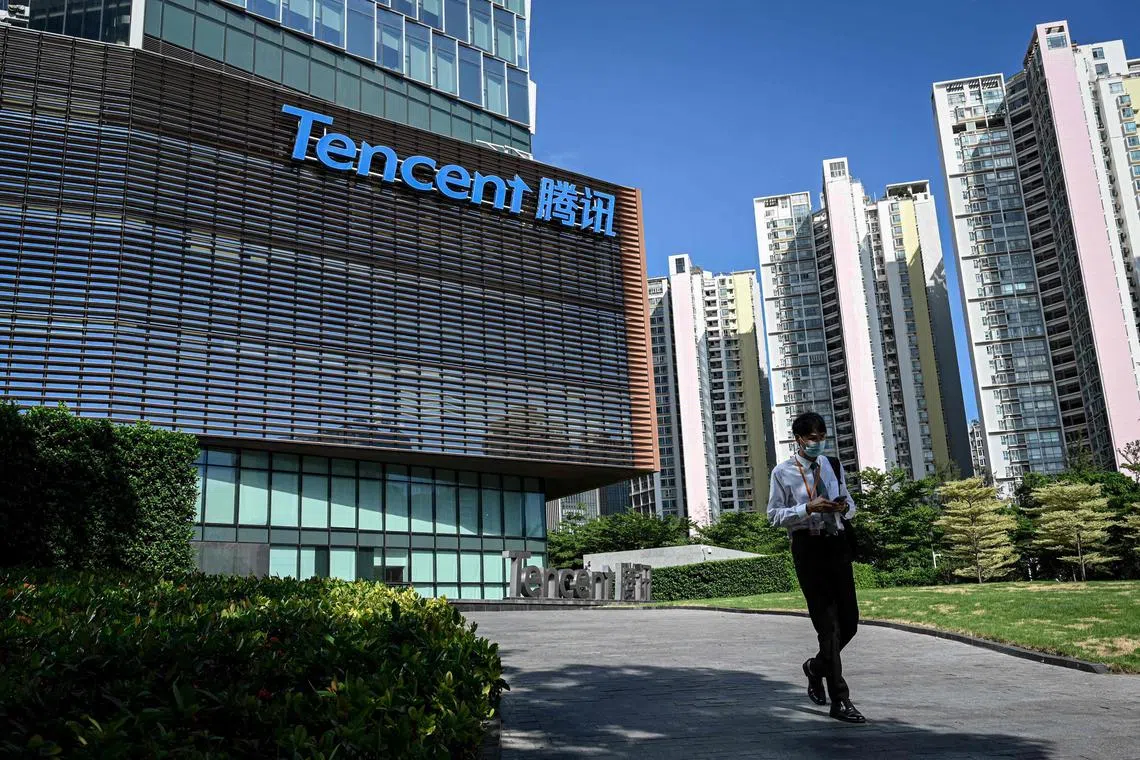Tencent revenue disappoints in warning for China tech sector
Sign up now: Get ST's newsletters delivered to your inbox

Tencent reported a less-than-expected 11 per cent rise in revenue after sales from major divisions including gaming and cloud services fell well short of projections.
PHOTO: AFP
Follow topic:
HONG KONG – Tencent Holdings’ revenue missed estimates, signalling an uneven recovery for the world’s biggest Internet arena as it grapples with rising Chinese economic turbulence and anaemic consumer sentiment.
The country’s largest company reported a less-than-expected 11 per cent rise in revenue after sales from major divisions including gaming and cloud services fell well short of projections. Online advertising surged 34 per cent – the fastest in almost five years – in part because of algorithmic tweaks and a favourable comparison with 2022’s Covid-19 trough.
Its shares slid as much as 2.5 per cent in Hong Kong on Thursday morning. The lacklustre results cast doubt over a long-awaited comeback for an embattled sector whose leaders from Tencent to Alibaba Group Holding barely grew in 2022.
Tencent’s net income rose 41 per cent to 26.2 billion yuan (S$4.9 billion) in the second quarter, lagging the 32.3 billion yuan average estimate in part because of a 2.99 billion yuan fine levied on its fintech business by regulators. Revenue rose to 149.2 billion yuan for the three months ended June, also missing projections.
Keen to rejuvenate the world’s No. 2 economy, Beijing has in recent months signalled that it is ready to unfetter the sector and conclusively end an era of unpredictable diktats. This has yet to translate into major policies, while Chinese consumer spending remains muted because of cloudy prospects for growth and employment.
Alibaba last week reported a better-than-expected 14 per cent revenue rise
Like Alibaba and JD, Tencent faces foes on multiple fronts: Old-time rivals like Baidu and Meituan are vying for dominance of the Chinese Internet, thanks to the emergence of generative artificial intelligence (AI). Baidu has so far stolen much of the limelight of the post-ChatGPT race, debuting Ernie Bot in March. Tencent is testing its own large language model among employees and said on Wednesday it plans to unveil a proprietary AI model later in 2023 that it believes will be among the country’s best.
Abroad, ByteDance and PDD Holdings continue to make strides, building on expansions that began when Alibaba and Tencent were forced to show restraint. Despite rising geopolitical tensions, apps like TikTok and Temu offer a template for older peers seeking to regain pre-crackdown heights.
At home, the Chinese economy is worsening as Beijing grapples with property sector turmoil, rising debt and flagging domestic consumption.
To tide it over, Tencent is intent on reviving mainstay businesses like gaming and advertising, while continuing to push cost cuts. This summer, the world’s biggest game publisher debuted blockbusters Valorant and Lost Ark in its home market, filling a long-empty pipeline after censors resumed licensing approvals in 2022.
Such new launches will test a rapidly saturating market, where younger players are increasingly drawn to anime games created by up-and-comers like Mihoyo. The maker of Genshin Impact just scored another hit with its April release of Honkai: Star Rail, which topped download charts in countries from China to Japan and the United States.
Tencent’s international gaming revenue rose in the quarter, while domestic sales plateaued, reflecting healthier spending abroad. Beijing in 2023 moved to further limit time spent online by minors, adding to already strict gaming curbs. BLOOMBERG

